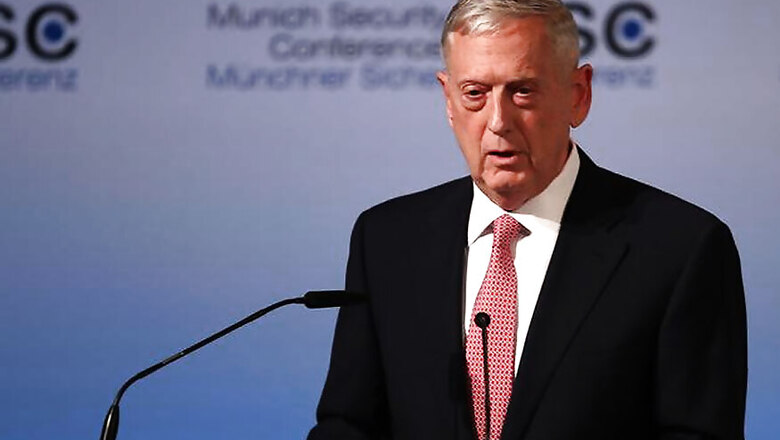
views
Washington: US Defence Secretary Jim Mattis has said that Syria will pay a "very, very stiff price" if it used chemical weapons again and asserted that America's top priority in Syria remained fighting the Islamic State militant group.
"If they use chemical weapons, they are going to pay a very, very stiff price," Mattis told reporters during his first Pentagon briefing as defence chief.
Notwithstanding the Russian allegations that the US is selling a false narrative over the use of chemical weapons by the authoritarian Syrian regime, Mattis defended the American missile attacks against Syria last week.
"Last Tuesday on the 4th of April, the Syrian regime attacked its own people using chemical weapons. I have personally reviewed the intelligence, and there is no doubt the Syrian regime is responsible for the decision to attack and for the attack itself," he said.
"In response to the attack, our government began a deliberate process, led by the National Security Council, to recommend diplomatic and military options to the president. We met over several days and I spoke with some of our allies," he added.
Mattis said the National Security Council considered the near-century-old international prohibition against the use of chemical weapons, the Syrian regime's repeated violations of that international law, and the inexplicably ruthless murders the regime had committed.
"We determined that a measured military response could best deter the regime from doing this again. As always, we examined how best to avoid civilian casualties in the execution of the strike, and our actions were successful," Mattis said.
"Based on these considerations, on April 6, the president directed military action consistent with our vital national interests to deter the use of chemical weapons," he said.
This military action demonstrates that the US will not passively stand by while Assad blithely ignores international law and employs chemical weapons he had declared destroyed, he added.
"We were aware of the presence of Russians at the airfield and took appropriate actions to ensure no Russians were injured in the attack," he said.
Mattis said the US military policy in Syria has not changed.
"Our priority remains the defeat of ISIS. ISIS represents a clear and present danger, an immediate threat to Europe and ultimately, a threat to the US homeland," he said.
Appearing along with Mattis, the US Central Command Commander Gen Joseph Votel said the US targeted 59 locations on the airfield and struck 57 of those.
"We assessed that we achieved our stated objective and the regime's ability to generate offensive military capability from Shayrat airfield, which we assess, was the launching point for this chemical attack has been severely degraded," he said.
"We are obviously paying close attention in the environment in the wake of these strikes and remain appropriately postured to respond as necessarily. Meanwhile, we are focused on the Defeat ISIS campaign, which remains our primary mission, Votel said.
Responding to a question, Mattis said the goal right now in Syria, and the military campaign is focused breaking ISIS and destroying ISIS in Syria.
"This was a separate issue that arose in the midst of that campaign. The use by the Assad regime of chemical weapons, and we addressed that militarily. But the rest of the campaign stays on track, exactly as it was before Assad's violation," he said.
Mattis alleged that Assad has used chemical weapons several times over the last several years, violated the international law that has prohibited their use since 1925.
"Syria is a signatory to that international convention.
For them to have done this several times recently over the last several years is what I mean by recently, you've got to ask him why he chose now to try it again, he said.
"I trust he regrets it now considering the damage done to his air force but when I say he should think long and hard about it, I'll just let the mission speak for itself on that score," the Defence Secretary said.
Mattis said he does not know if the Russians knew about the chemical attack in advance.
"It was very clear that the Assad regime planned it, orchestrated it, and executed it. And beyond that, we can't say right now. We don't know anything beyond that," he said.




















Comments
0 comment